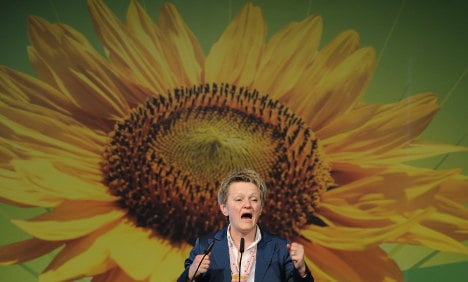Who would want to be mayor of Berlin? Sure, there are worse jobs. Salesman in one of the German capital’s many sex shops, perhaps. But to be mayor of Berlin is to live a lie: you have to pretend that this strange fractured city is still governable. You have to act as if your decisions make a difference when actually the actions of City Hall are increasingly irrelevant to everyday life in Berlin.
And now the formidable Renate Künast – who has always reminded me of the Belgian comic strip Tintin – has declared herself a candidate for the job. Like Tintin, the roving reporter, she is constantly on the move in search of adventure, solving mysteries, unmasking bad men. And just as we never see the cartoon journalist actually writing a story, we rarely see Ms. Künast actually making decisions. So it could be that she is just about perfect for the Berlin job.
The Greens are astonishingly popular at the moment because they are deemed to be in accord with the zeitgeist. There is a deep suspicion about insensitive political decision-making, the inability of politicians to address popular fears and resentment.
We need to find new ways of conducting a political conversation – that is obviously what Stuttgart 21 demonstrates. The protestors there, and near Gorleben in recent weeks, were overwhelmingly bourgeois – doctors and teachers in Timberland boots angry that politicians did not seem to be treating them seriously. Increasingly Berliners feel the same about their centre-left Social Democratic Mayor Klaus Wowereit, that he has stopped listening. The Greens, on the other hand, have created a whole culture of political debate. They remain the party of speech therapy.
But when it comes down to governing rather than consulting, Greens too often resort to pressure, to force. The classic example is the Marburg solar panel obligation: the ruling that all home owners have to heat their water with solar energy when they renovate their houses. From the English point of view, this is an extraordinary infringement of property rights. The Greens’ party conference later this month will set national targets – complete ecological power by 2030; oil heating out of houses by 2015 – that can only be realised by compulsory measures. That is the paradox of Green power. On the one hand it promises a consultative democracy; on the other hand it denies choice for those people who do not want, or cannot afford, to conform with a politically correct approach to containing climate change.
If Renate Künast becomes mayor, will she act as an eco-dictator, a kind of Green Imelda Marcos? The truth is that the most successful Green mayors – in Tübingen and Freiburg – have been directly elected and enjoy popular support, a licence to experiment. Künast does not have this luxury. The only certainty is that Green city management functions best in rich communities such as clean and tidy Swabia. There, they argue about the hazards of leaf blowers. Here in Berlin we are knee deep in dog shit, much of it hidden by leaves.
There is a difference between Green government in the southwest of the country and in this proletarian capital. What seems like eco-dictatorship in Marburg may be the only way to change behaviour in Berlin. A Mayor Künast would impose a general 30 kilometre speed limit on Berlin with the exception of the main roads. Is that dictatorial? Many taxi drivers will say so. But slower traffic and parking meters in the centre of town will make Berliners think twice about using cars. Frustrated Berlin motorists will shift to public transportation. I find that just fine. Even an increase in bike paths, as planned by Künast is acceptable providing she doesn’t actually order me to get on a bicycle. But naturally such a policy has to be supported by more investment in public transport. Wowereit once declared it to be a top priority, though nothing much came out of that, partly because he had not developed a proper urban mobility strategy, but also because there is no money to invest.
Here we come to the hub of the problem of the Künast candidacy. I don’t mind a woman giving me orders; we all have to get used to that. But she has to prove that Green plans can be achieved with less, not more bureaucracy. And that she has the financial competence to juggle priorities, freeing up money for some new urban investment, while at the same time making intelligent cuts to reduce Berlin’s ridiculous levels of debt. Is she capable of doing that? I don’t yet see the evidence.
Despite her image in the boulevard press, Künast is not a revolutionary. Britain’s Prince Charles once declared Renate Künast to be his favourite German politician – I suppose he likes her plan to have more wilderness areas in Berlin’s parks – so we may yet see a special Anglo-German axis develop.
An eco-King Charles and a Mayor Künast exchanging tips about the post-industrial future? It could happen. But for Charles to be credible he will have to give up some of his expensive palaces and cut back his air miles. And Mayor Künast will have to find the money to turn Berlin’s mountains of dog crap into bio-energy. Nothing less will convince Berliners that their city is ready for a green revolution.



 Please whitelist us to continue reading.
Please whitelist us to continue reading.
Member comments